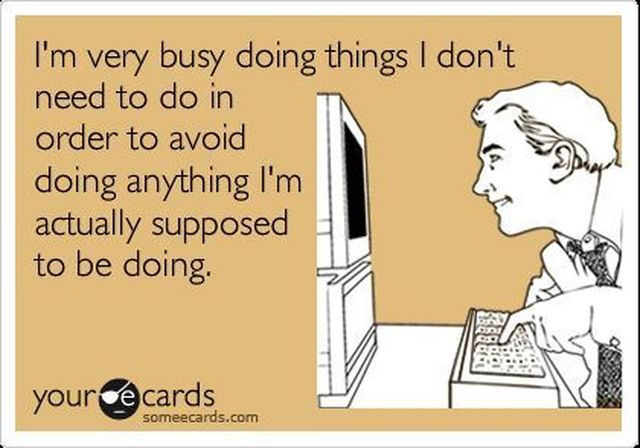Even the most driven, successful, resourceful, motivated and well-intentioned person in the world deals with inspiration breaks, time offs, laziness and gets spaced out, every once in a while.
The difference maker, then, is to know one self, acknowledge the space and time required to bounce back, and gather the tools to keep delivering.
Learn how to anticipate your daily, weekly and monthly productivity breakdowns, avoid burn outs, meltdowns and break downs, and – most off all – get to know yourself, your wants and needs, your plans and goals, your dreams and desires.
What is procrastination? Why do we procrastinate? How should we deal with procrastination in order to have more productive and fulfilling lives?
Procrastination has nothing to do with taking a pause, resting or that “dolce far niente” we enjoy so much in a Sunday afternoon. Although it might be seen as a daily break period or energy loss, it is more accurate to see it as avoiding suffering.
Procrastination is the single and most fundamental reason why we give up on some activity or never even find the energy or time to start. Since it can emerge several times through the course of our daily life we should understand first what this is, where does it comes from, why it installs so easily in our routines and how we can prevent it from happen.
.
“What would the child you once were think about the adult you’ve become?” (Robin Sharma)
A few years ago I took a moment to think about this and I’ve realized that the child I once were enjoyed playing basketball, loved chess and wanted to be a musician. I also realized that I stopped playing basketball for about 10 years, never developed ability in chess and I wasn’t playing music that I really liked.
What happened? Most of all, why do we struggle so much starting a new diet, enduring a fitness training, waking up earlier, meditate, going to work, practicing a new song on our instrument, and so on?
How do we stop procrastination, once and for all?
Firstly we need to acquire the consciousness of WHAT we are doing. We are procrastinating. We are deliberately postponing our activities, our work or our personal investments by collapsing into a vegetative, demoralized, uninspiring frame of mind, instead of being productive, actively energetic and happy.
Secondly we need to understand WHY are we avoiding a task. Work on WHY and the process – the HOW – will unveil. It will empower you with the ability to take control of your life, regaining control of WHAT you really enjoy doing.
Here are the 5 main reasons why we avoid a task:
1 – To avoid overwhelming;
2 – To avoid things we don’t enjoy;
3 – To avoid our mind’s suffering story about an activity;
4 – To avoid present suffering through distracting activities;
5 – To avoid a task that isn’t the right fit for us.
.
1 – How to deal with overwhelming?
The mere fact of having a lot of things to do can be extremely stressful and painful. In this situation, the task at hands is way to big for our current abilities or it takes too much time to finish.
When this feeling settles, one should do the following:
- Break the big task into smaller chunks;
- Focus on one thing at a time;
- Set a deadline to finish the job.
In the state of surrender, we see clearly what need to be done and we act by doing, focusing on one thing at the time. This is the core of The Mindful Practice Process.
Remember the proverbs:
- Penny and penny laid up will be many;
- Slowly but surely;
- Little strokes fell great oaks;
- Slow and steady wins the race.
.
2 – How to deal with un-enjoyable tasks?
Take a moment to think if the task at hands is, definitely, not enjoyable.
Were you already feeling unhappy BEFORE you started performing the task?
Where did that unhappiness came, from the task it self or from something else? Did you started thinking that it was the task it self that made you unhappy?
Identify what thoughts make you suffer while you perform the task. Thoughts like anxiety, inadequacy and comparisons may disrupt your natural excitement and happiness levels over the task at hands.
When we focus on a result and fear a negative outcome we may experience anxiety. Since you can never know what is the best possible outcome, worrying over a future result adds nothing to your inner peace.
This is like throwing a seed into the ground expecting it to rise instantly into a beautiful tree. You can’t predict or control the outcomes of your actions so focus on the present moment and enjoy.
Think positive and visualize all the good outcomes from the future task at hands. Also visualize the worst-case scenario and the tools you could use in order to outcome that negative experience. This will prepare you for want may come.
.
B) Inadequacy
Insecurity thoughts like “I’m not good enough” lead us to a feeling of inadequacy towards a task, and this feeling can be very demoralizing and atrophying.
The solution for this is to ask yourself:
- “Do I know that feeling is true?”
- “Haven’t I done this before?”
- “If I’m not capable at this time, what should I work on to make myself capable?”
Find out if your feelings and thoughts about inadequacy are true. If they are, you only have two options: Give up and move on, or buckle up and maximize your performance. What’s it going to be, mate?
.
C) Comparisons
We often idealize the perfect world, the perfect life, the perfect marriage, the perfect job or the perfect moment. By those standards, the real world always seems to be lesser than the perfect imaginary fantasy world in our heads.
When you daydream you start believing that the present moment is insufficient and lacking. That creates boredom and unhappiness.
But the truth is that “There is never ‘Nothing’ going on”. Something is always happening, and even when you think that the tree you have planted stopped it’s growing that’s the moment when the roots of the tree reach deeper into the ground.
The world is an enormous place and there are millions of different things to explore out there. Our only concern, as human beings, should be what to choose next. Where will you focus your attention now?
In order to stop unrealistic comparisons that only get’s you down, try the following:
- Be mindful about the present moment;
- Take time to notice things outwardly and inwardly;
- Stop daydreaming – ”Don’t think about the sunset. Look at the sunset”;
- Notice how thoughts create suffer and part you from peace.
To compare is to live in thoughts, and they can distort your perception of reality. Start feeling more deeply what is actually happening, and less what your thoughts say about it.
Understand that achieving goals or finding purpose and meaning doesn’t change your real life while your old thoughts remain in your mind or aren’t eliminated.
Outcomes don’t impact your peace. Outcomes don’t change the thoughts in your head. Only you can do that by shifting your focus and attention to “What Is”.
.
Next week, in Part II we will cover:
3 – Our mind’s suffering story about an activity;
4 – Present suffering through distracting activities;
5 – Tasks that aren’t the right fit for us.
.
For more on the subject check Noah Elkrief’s site on http://www.liveinthemoment.org/how-to-stop-procrastinating/




